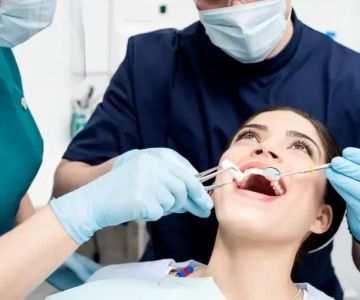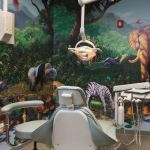Common Signs of Dental Emergencies
Dental emergencies can strike unexpectedly and it's crucial to recognize the signs that indicate you need to visit an emergency dentist promptly. One of the clear indicators is a severe toothache that persists and doesn't respond to over-the-counter pain relief. This could be a sign of an underlying infection or damage to the tooth's pulp. Another significant sign is a badly cracked or broken tooth. The location and severity of the break determine the treatment approach, but immediate attention is necessary to save the tooth. Gum disease is also a concern. Noticeable symptoms such as swelling, bad smell when flossing, or aching gums could indicate the early stages of gum disease, which requires prompt treatment to prevent further damage.
A knocked-out tooth is a serious emergency. If this happens, handle the tooth carefully by the crown and rinse it gently. Try to reinsert it into the socket if possible or keep it in milk until you can see a dentist. An extruded tooth, which is partially dislodged, also requires immediate dental attention. Dental abscesses, with swelling of the face and jaw, are a serious condition that demands urgent care. Lost or broken dental restorations, like fillings or crowns, should be addressed as soon as possible to avoid further complications. Severe soft tissue injuries, such as deep cuts or persistent bleeding, also warrant a visit to the emergency dentist.
Differentiating Between Emergencies and Non-Emergencies
Sometimes it can be challenging to determine if a dental problem is an emergency or can wait. For instance, a dull or mild toothache might not be an immediate emergency, but it still requires a prompt appointment with your dentist. A small chip or crack in a tooth may not be urgent unless it causes discomfort or has sharp edges. Broken braces are usually not an emergency unless there's bleeding. If something is stuck between your teeth, gentle removal with appropriate tools is recommended. Minor soft tissue injuries can often be managed at home with proper care, but severe bleeding requires professional attention.
Treatment and Management
In cases of severe toothache, rinsing the mouth with warm water, using dental floss, and taking appropriate pain relievers can provide some relief until you see a dentist. For a badly cracked tooth, save the broken pieces and apply a cold compress to reduce pain and swelling. If you have a knocked-out tooth, follow the correct preservation steps. For an abscess, rinsing with a salt-water solution can help, but professional treatment is essential. Lost or broken dental restorations should be dealt with promptly to prevent further damage.
When to Seek Emergency Room Care
If tooth pain occurs when your dentist's office is closed, going to the nearest emergency room might be necessary. The emergency room staff can provide temporary relief with medications, but restorative treatments will still require a visit to your dentist when they are available. Remember, prompt and timely treatment is key to avoiding more serious complications and preserving your oral health.
Conclusion
Recognizing the signs of a dental emergency is crucial for timely and appropriate treatment. Whether it's a severe toothache, a broken tooth, an abscess, or other significant dental issues, acting quickly can make a significant difference in the outcome and your overall oral health. Don't hesitate to contact your dentist or seek emergency care when needed to ensure the best possible outcome for your teeth and gums.




 Shine Orthodontics and Pediatric Dentistry
Shine Orthodontics and Pediatric Dentistry Aspen Dental
Aspen Dental Beverly Hills Orthodontics - LA
Beverly Hills Orthodontics - LA Access Dental Group Manhattan PLLC
Access Dental Group Manhattan PLLC Loma Linda University Center for Dentistry and Orthodontics
Loma Linda University Center for Dentistry and Orthodontics Children's Dental Health of Plymouth Meeting
Children's Dental Health of Plymouth Meeting The Importance of Oral Health Education During Pregnancy for a Healthy Pregnancy
The Importance of Oral Health Education During Pregnancy for a Healthy Pregnancy Why Skipping Dental Checkups Can Lead to Bigger Oral Health Problems
Why Skipping Dental Checkups Can Lead to Bigger Oral Health Problems Advantages of Porcelain Dental Restorations
Advantages of Porcelain Dental Restorations Best Tips for Brushing Your Teeth Properly for Healthy Gums: Essential Techniques for Oral Health
Best Tips for Brushing Your Teeth Properly for Healthy Gums: Essential Techniques for Oral Health How Can Diabetes Cause Tooth and Gum Problems? Preventing and Managing Oral Health Issues
How Can Diabetes Cause Tooth and Gum Problems? Preventing and Managing Oral Health Issues Healthy Habits for Promoting Good Oral Health and Hygiene: Tips for a Healthy Smile
Healthy Habits for Promoting Good Oral Health and Hygiene: Tips for a Healthy Smile